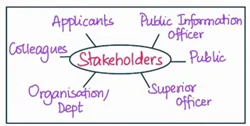Answer:
| Approach:
Introduction
- Shortly analyze the case study.
Body
- Analyze each options with merits and demerits.
Conclusion
|
Introduction:
The Public Information Officer (PIO) is faced with an ethical dilemma regarding disclosing information that may lead to disciplinary action against him and his colleagues.

Body:
Option (i): Referring the matter to the superior officer and acting strictly according to their advice:
- Merits: Seeking guidance from a superior officer shows respect for hierarchy and ensures compliance with organizational procedures. It may provide a clearer perspective on the situation and potential solutions.
- Demerits: The advice of the superior officer may not align with the best ethical course of action. Following their advice blindly could compromise the principles of honesty and transparency.
Option (ii): Proceeding on leave or transferring the application to another PIO:
- Merits: Removing oneself from the situation can avoid direct involvement and potential disciplinary action. Transferring the application can shift responsibility to another officer.
- Demerits: This option may be seen as evasive and may raise suspicions about the PIO’s intentions. It does not address the ethical dilemma at hand.
Option (iii): Weighing the consequences and replying in a manner that compromises the information:
- Merits: This option aims to protect the PIO’s career while still providing some information. It seeks a balance between honesty and self-preservation.
- Demerits: Compromising the contents of the information goes against the principles of transparency and may be seen as unethical. It could damage the credibility of the PIO and the organization.
Option (iv): Consulting colleagues who are party to the decision and taking action based on their advice:
- Merits: Seeking input from colleagues can provide different perspectives and insights. It promotes collaborative decision-making and shared responsibility.
- Demerits: Depending solely on colleagues’ advice may lead to biased or self-serving recommendations. It does not guarantee an objective and ethical solution.
Conclusion:
- The most appropriate course of action would be to choose option (i) and refer the matter to the superior officer.
- However, it is important for the PIO to exercise critical judgment and evaluate the advice received.
- If the advice conflicts with ethical principles, the PIO should consider seeking further guidance from an ethics committee or a higher authority.
- It is crucial to prioritize honesty, transparency, and accountability while navigating the situation.
